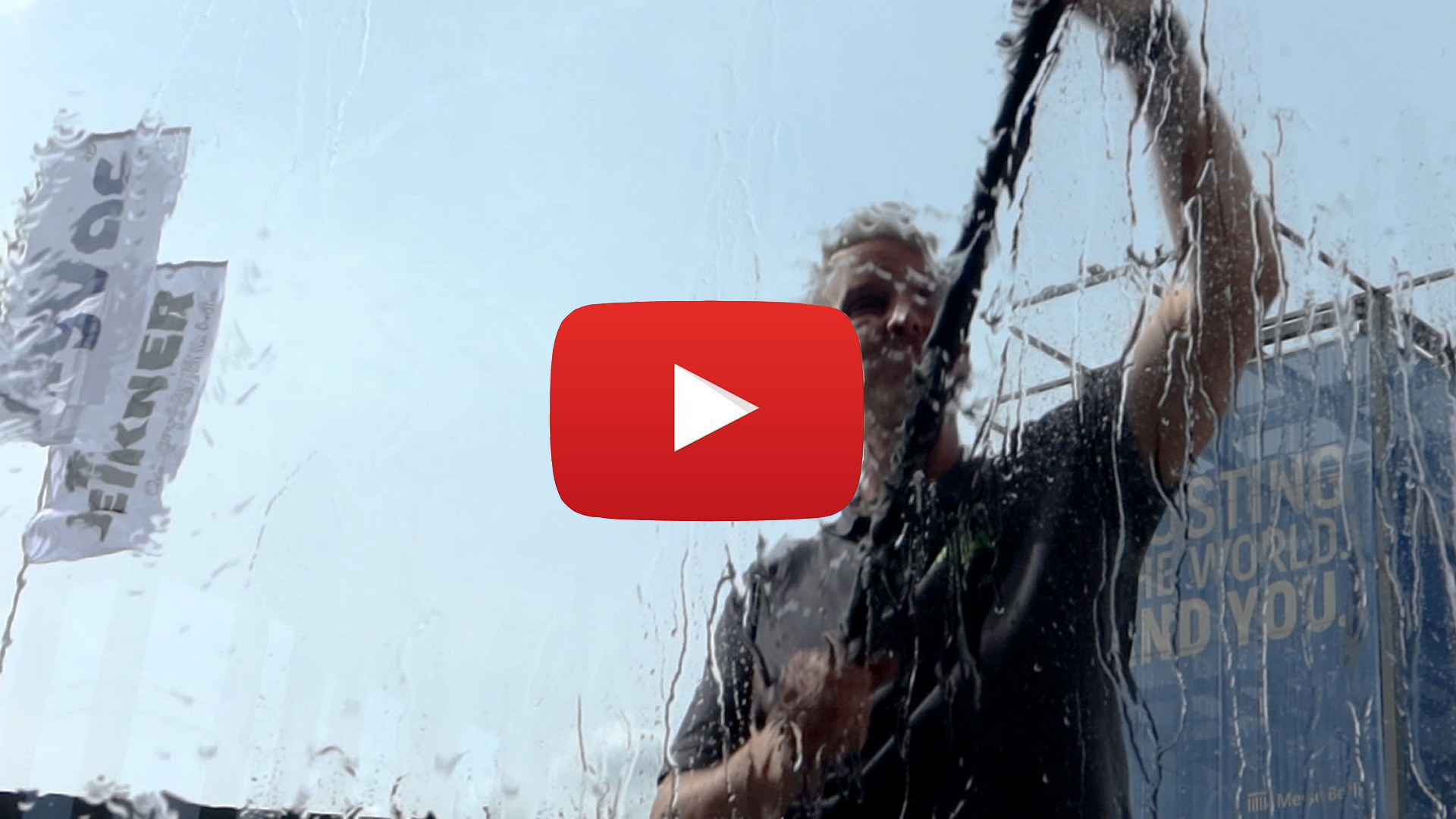Seiteninhalt
Presse-Information
CMS Berlin Update - Day 4
Number of the day
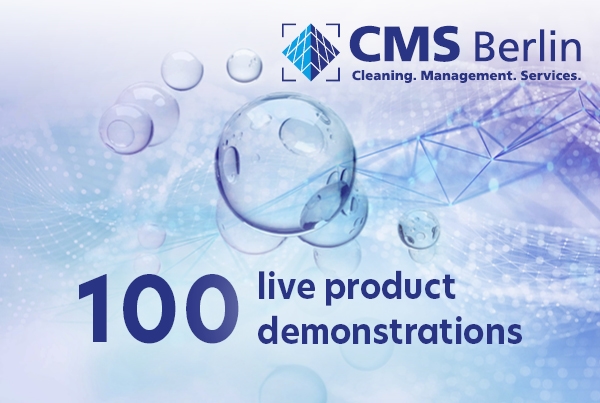
Exoskeleton test: how to make light work of strenuous tasks
The S700 exoskeleton that Juliette Bernard, head of marketing at exoIQ, straps onto my back feels like a lightweight hiking backpack. It is supposed to give my arms support, for example when working at altitude for lengthy periods.
A few adjustments are all it takes to adapt the device to my height. “It is important for the weight to rest on your hips“, she says, then secures the belt and adjusts the arm protectors which remind me of a carapace. What is surprising is that the exoskeleton weighs six kilos. It feels like no more than two, due to its even weight distribution.
Work becomes less strenuous
At the touch of a button Juliette Bernard activates the rear-mounted hydraulic motor, which hums quietly. The control unit resembling a walkie-talkie is an intuitive device that starts and pauses pre-configured assistance programmes.
The exoskeleton makes me feel a bit like a puppet. When I lift my arms sideways it raises them even further. When I push upwards it feels like I can rest them on the arm protectors.
The S700’s integrated battery runs for four to six hours. Each device comes with a replacement battery. However, the purpose of the exoskeleton is not necessarily to complete an eight-hour shift. Instead, it is to help workers perform well consistently when carrying out overhead tasks over extended periods of time. It does not give users supernatural powers. But after a long day’s work they may well be less exhausted.
Lack of long-term studies
One convincing reason for wearing an exoskeleton is the frequent occurrence of musculo-skeletal complaints. They are the reason for one-quarter of workers reporting sick. The hope is that ergonomic assistance can reduce these complaints. At the same time it could make it easier to sustain an ageing workforce.
In her speech at the Practical Forum in Hall 6.3 at CMS Berlin, Kerstin Steindorf, head of Ergonomics in the Health department at the trade association of the building industry (BG BAU), put a damper on expectations. In her opinion, the manufacturers’ promises of offering a potentially reduced workload have to be treated with caution. To date, no standardised methods exist for evaluating exoskeletons. Studies on possible long-term effects are also lacking.
Adaptation phase
What is positive in her view is that exoskeletons stabilise the spine and hips, possibly preventing an abnormal posture. Companies should definitely schedule an adaptation phase so that users can get used to operating one.
“An introduction is necessary, otherwise companies will have no success with using an exoskeleton“, says Kerstin Steindorf. In order for these devices to become more accepted, companies should involve employees from the beginning and possibly even let them choose the model that suits them best.
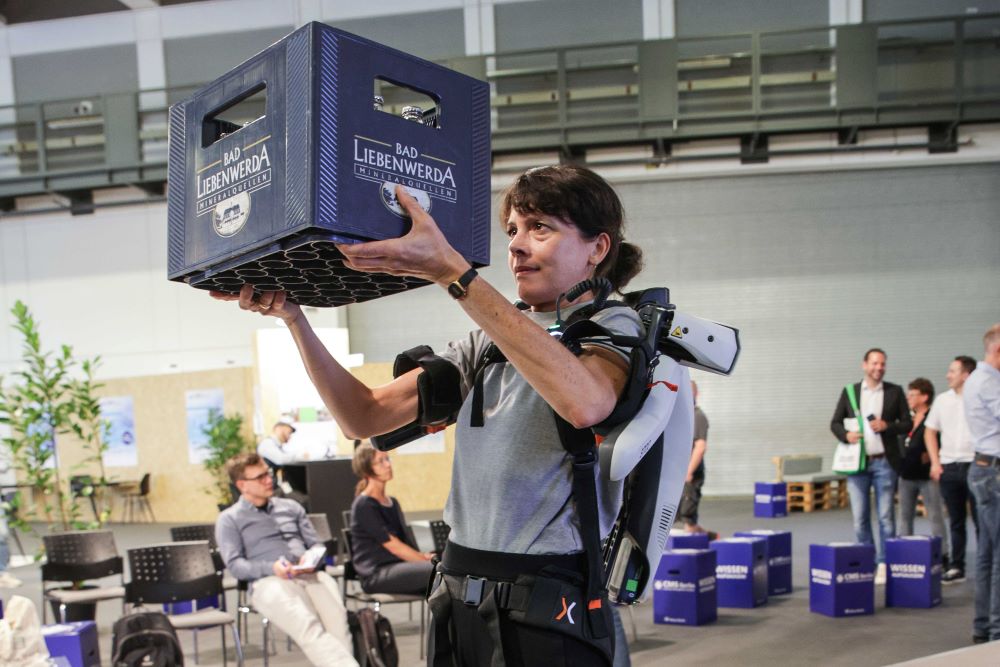
Smart planning: cleaning – in the right place at the right time
Home working, hybrid working and the skills shortage are making cleaning work increasingly complex. Consequently, more and more sophisticated digital solutions are being developed to make work planning efficient and customer satisfaction even better, and these are on display at CMS Berlin 2023.
AI-controlled flexible planning avoids overloads
At the top of the list is the winner of this year’s CMS Purus Innovation Award (PIA) in the Digital Tools and Systems category. Soobr – Smart Cleaning, an AI-driven planning tool from Schweizer Soobr AG replaces rigid cleaning schedules with flexible planning. First of all, the software creates a digital room organiser that lists all the contractually specified jobs and their cleaning intervals. AI then schedules the areas and jobs to be carried out along with time parameters, handles sick notes received, at the same time always balancing the demands of peak work periods and one-off jobs such as removing cobwebs.
With Soobr, the cleaning staff obtain their schedules from an app, which they can also use to report events. Furthermore, using data analysis the system can respond flexibly to fluctuating office occupancy, so that cleaning always only takes place where strictly needed or upon a customer’s request. (Hall 3.2, Stand 104)
Digital checklist and customer feedback replace handwritten notes
Taqt SAS has developed a digital checklist for washrooms and meeting rooms. With the Taqt One system, one of the finalists at PIA 2023, there are three options. The basic model, which is battery-operated and has a SIM card, is about the same size as a tablet and is attached to the room wall. Cleaning employees log themselves in and out with a personalised chip or ID card, and the data is sent to object management. In order to obtain customer feedback an additional interface can be installed on the device. Users can rate the room service with smileys. A further application handles events. Customers can press a button to report missing paper or soap or if a room requires cleaning. (Hall 5.2, Stand 212)
Cobotic: when man and machine work hand in hand
In 2023 the third PIA finalist was the Nexaro Hub, an easy-to-use software for fleet management which controls robot vacuum cleaners. The name given by Nexaro is Cobotic – short for efficient cooperation between man and machine. The small and easily manageable Nexaro NR 1500 does the vacuum cleaning chores while the cleaning staff carry out its maintenance and are otherwise occupied with jobs requiring their expertise. Based on building structure plans, the Nexaro Hub organises timetables and schedules for the robot vacuum cleaners, collects their cleaning reports and relays information about malfunctions and unfinished jobs. (Hall 3.2, Stand 147)
Soap dispensers that request refilling
Data-driven cleaning is also a feature of ’Tork Vision Reinigung’, a digital washroom monitoring system. Sensors are installed in rooms, cubicles and dispensers that alert the relevant cleaning staff and facility manager via an app depending on the situation, for example if a soap dispenser requires refilling, or the number of persons frequenting a toilet has reached a limit. Cleaning staff receive their job information in order of priority. According to Essity Professional Hygiene Germany, which markets the product, it potentially reduces the amount of times dispensers require monitoring, often unnecessarily, by up to 90 per cent. The company calculates that if a building has 100 dispensers which require checking five times a day, up to three hours time can be saved. (Hall 4.2, Stand 218)
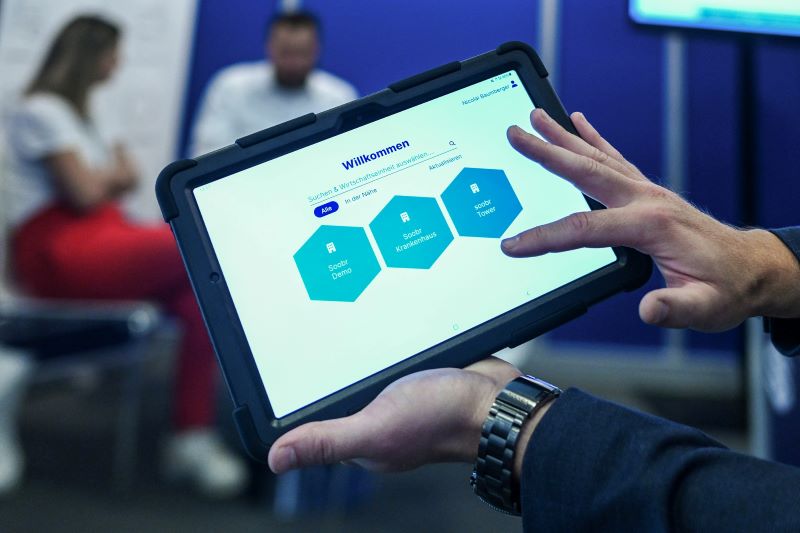
Live and in colour: washroom hygiene solutions
Steam would appear to be the answer to removing every kind of soiling imaginable. The machines marketed by Beam (Hall 3.2, Stand 119) can deal with sticky deposits on tiles, wipe supermarket cabinets without streaking, and clean hotel bathrooms and the large kitchen areas used in food production. They can also get to grips with dirty upholstery or carpet stains, all of this using steam only.
With its range of machines for use in industry, the hotel trade and private households, the company is responding to consumer demand for chemical-free cleaning products. At CMS Berlin visitors can find out for themselves how effective they are. Demonstrations take place regularly on the stand.
From cloth to tiles
Kimberly-Clark (Hall 4.2, Stand 211) has also committed itself to becoming sustainable. At CMS Berlin a large themed wall display depicts the life cycle of paper and cloth towels and plastic dispensers. As part of its Right Cycle campaign the manufacturer employs qualified disposal companies to collect the waste items for reprocessing.
Surprisingly, oily rags can be used as a primary energy source, for example in tile manufacturing, an energy-intensive industry.
Kimberly-Clark also has a solution for its discarded plastic dispensers. These are turned into the granules from which flowerpots and park benches are made.
The company shows how paper can be recycled to make paper again, taking used disposable towels as an example. These are collected, pressed and reprocessed into paper at its plant in Koblenz, thereby completing the entire product cycle.
A chemical-free clean bath
Wecoline’s Bubble Flush makes cleaning toilets easy and eco-friendly. On the stand of Mobiloclean (Hall 2.2, 201 und 200a) visitors can watch a handy ultrasound instrument being used to work limescale inside a transparent bucket. At the touch of a button it vibrates, producing small sturdy water bubbles which suddenly vanish and dissolve the deposits without any cleaning agents.
The company also has a solution for cleaning residues, for which Wecoclean has invented a water retainer which closes the P-trap, keeping water inside the basin. After cleaning has taken place underwater, the retainer is lifted slightly to let the water drain.
According to the manufacturer, this innovation, which was nominated for a Purus Innovation Award (PIA) at CMS Berlin 2023, potentially reduces chemical usage by 1.5 litres per toilet every year. Bubble Flush is easy-to-use and designed for daily use.
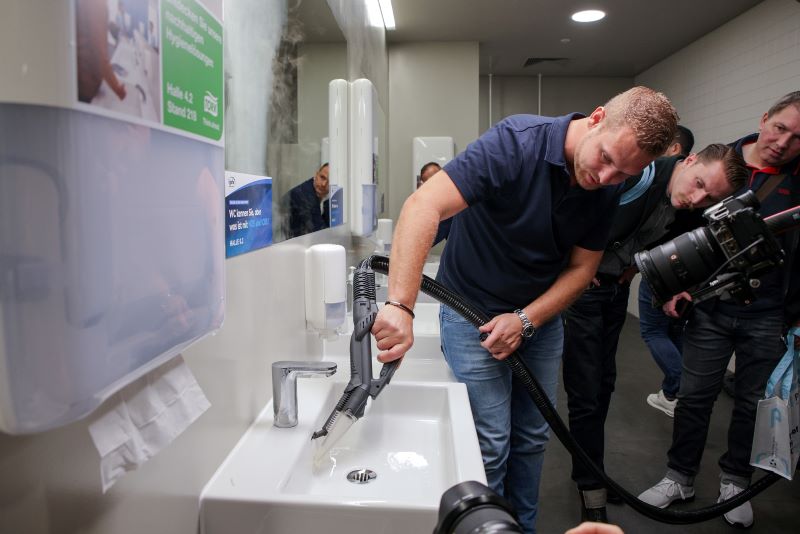
Cost-efficient hygiene: New developments in healthcare
Since the Covid pandemic the nursing sector has come under cost-cutting pressure. At the same time there is a growing awareness of sustainability in the healthcare sector. Both aspects also affect the cleaning industry. According to Thorsten Schmitz, authorised signatory at Fachgroßhandelsgruppe GVS Group, the healthcare sector wants to shed ballast while also improving its own processes. At CMS Berlin manufacturers are offering all kinds of different solutions.
Cartridges and sachets for correctly dosing disinfectant
Cost transparency and sustainability are what the latest products from Kleen Purgatis GmbH in Hildenhausen (Hall 4.2, Stand 100) are all about, for example. LAVO DES 60 KOMPAKT, a tried and tested disinfectant, is now also available in pre-portioned sachets or cartridges for automatic dosage systems. At CMS Berlin, Kleen Purgatis is also presenting the MULTI KLEEN TAB PRO for daily cleaning maintenance, including for its SANIVEX sanitary cleaner. A single tab per bottle is sufficient for 500 ml of cleaning solution, usable for 28 days. “A precise dosage makes these products even safer to use. Intensive user training is not required, and for companies the costs are transparent because the dosage no longer fluctuates“, says marketing director Laura-Maria Rullàn-Lemke.
Sealing floors against hospital microbes
The focus of this Dr. Schutz Group product which is making its world debut is on improving hospital safety. In the fight against high-risk hospital microbes VIROBAC has developed an antimicrobial coating for hospital floors (Hall 2.2, Stand 137). Following its application both artificial and natural light activate singular oxygen which kills off microbes. According to the manufacturer, this allows cleaning and disinfection intervals to be reduced by half. Neither is the product hazardous nor does it encourage bacterial resistance.
Flexible Click-and-Go system for cleaning carts
The clip system from Toolflex (Hall 3.2, Stand 243) is immensely practical, especially from a hygiene point of view. The Swedish company has been on the market for many years with its wall mounting and device holder system which it describes as a world-beater. A new feature is a cleaning cart with a Click-and-Go system for attaching all the necessary utensils and which can be clipped onto the wall in a hospital ward for example – an ideal solution for isolation rooms, says Robert Fleischhauer, sales area manager, Germany. Another new feature is that the clips come with a flexible mounting that can safely accommodate many different sizes. All the utensils can be easily unclipped from the cleaning cart for easy disinfection and sterilisation.
Individual cleaning cart configurations
Clino cleaning carts from Pfennig Reinigungstechnik (Hall 4.2, Stand 216) have been tried and tested in hospitals for over 30 years. The latest dual-function Clino STEC7-R SC Duo can be configured for two separate cleaning purposes. It can be set up to customer requirements without using tools, for example with mop holders, a clipboard or work instructions. The cleaning cart is manufactured in Germany from nearly 70 per cent recycled materials.
DIE BLAUE – do you wash your hands properly?
Those interested in knowing more about their hand-washing habits or instructing co-workers on safe hand hygiene can visit the Cologne-based startup COLOR SAFE on Stand 300c in Hall 5.2, where they will find DIE BLAUE – a natural soap featuring a colour indicator for those parts of one’s hands not yet thoroughly washed. Surprisingly, almost 90 per cent of people do not wash their hands properly.
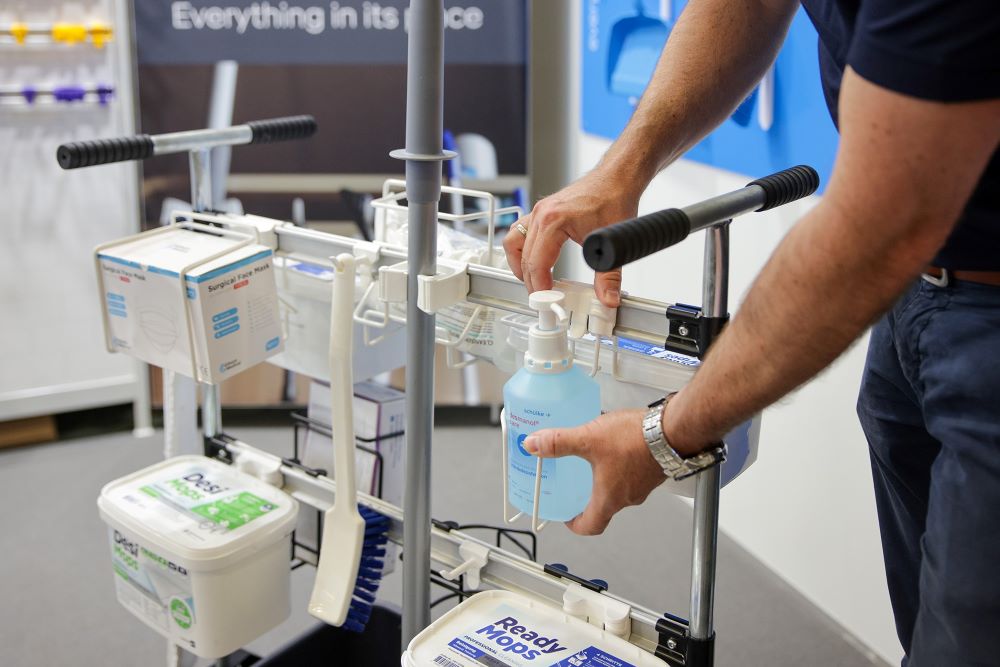
Reference
Overview with all events: https://www.cms-berlin.de/de/Die-Messe/Rahmenprogramm-Events/
Video of the Day
You can apply for accreditation for CMS Berlin online at https://www.cms-berlin.de/de/presse/akkreditierung/
Current press material such as press releases and press photos for download are also available online.
More Information: www.cms-berlin.de
Follow us: twitter, YouTube, LinkedIn, Instagram.
About CMS Berlin
From 19 to 22 September 2023 CMS Berlin, leading trade fair for cleaning and hygiene industry, will be gathering the industry at an in-person event again in Berlin.
Occupying an area of more than 31,000 square metres in the halls and on the outdoor display area, around 450 exhibitors, the highest number to date, took part in CMS Berlin 2019. Coming from 25 countries, they provided a comprehensive overview of the products and services from every branch of the commercial cleaning industry. Some 25,000 representatives of the industry, including around 21,000 trade visitors from 80 countries and every cleaning market, came to the four-day cleaning trade fair to find out about the latest products and services on the commercial cleaning market.
CMS Berlin is organised by Messe Berlin GmbH and takes place every two years. The following professional organisations are sponsors of the event: the Federal Guild Association of the Cleaning Trade (BIV), Bonn, the Cleaning Systems Trade Association in the German Mechanical Engineering Industry Association (VDMA), Frankfurt/Main, and the Hygiene Industry Association (IHO), Frankfurt/Main.
About CMS PLUS
The community and business platform CMS PLUS is the virtual addition to the international cleaning trade fair CMS Berlin. It offers the cleaning industry interactive features for even more dialogue, information, networking and presentations.
About Messe Berlin
Berlin has been a trade fair destination for 200 years, and has been one of the most important such hubs for many decades. Messe Berlin – the state’s own trade fair company – conceives, markets and organises hundreds of live events every year. It strives to be an outstanding host for visitors at all events, generate optimal business stimuli, and provide fair conditions for everyone. This concept is reflected in the company slogan: Messe Berlin – Hosting the World.



